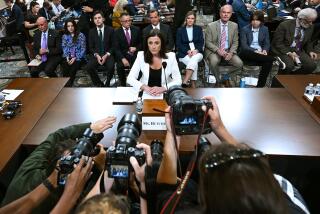Aide to Wright Sought Money, Witness Says
- Share via
DALLAS — A former savings and loan executive on trial for charges of election fraud testified Monday that an aide to House Speaker Jim Wright (D-Tex.) asked for political contributions of $25,000 apiece from several thrift associations in 1985.
The executive, Robert Hopkins, said the solicitation followed a meeting Wright had with between 70 and 100 savings and loan officials in June, 1985, at a Dallas-area hotel.
Hopkins said Wright “was willing to give us an ear to listen to our problems. . . . He indicated to us that he understood the industry problems and that he was concerned like we were.”
Hopkins said he could not recall who on Wright’s staff suggested the figure of $25,000 from each thrift association, but he believed that the solicitation was made after Wright had left the hotel after addressing the loan executives.
Earlier Trial Testimony
Hopkins, however, could not corroborate trial testimony earlier this month from another loan executive who said he was told that Wright had promised to bottle up unfavorable legislation in a House committee if thrift officials could raise a total of $250,000 for the East Texas First Political Action Committee.
“I never heard anything about that,” Hopkins said of the earlier testimony by David R. Farmer, a former officer of Commodore Savings Assn.
Hopkins and two other former officials of Commodore are on trial on charges that they participated in what federal prosecutors say was a conspiracy by the thrifts to evade federal election laws by making illegal corporate contributions to political campaigns.
Farmer, who had been chief financial officer at Commodore, said he gave a $1,000 donation to the East Texas PAC, then was told to file a false expense report to get the money back.
The PAC contributions were to be used to help another Democratic congressional candidate favored by Wright, but not the Speaker himself, Farmer said.
At the time of the contributions, Wright was House majority leader and the Texas S&L; executives were anxious to head off legislation moving through the House that would have greatly restricted their investment powers. The legislation won approval from the Banking Committee but never reached the House floor.
Wright has denied that he ever sought to kill the legislation.
More to Read
Get the L.A. Times Politics newsletter
Deeply reported insights into legislation, politics and policy from Sacramento, Washington and beyond. In your inbox twice per week.
You may occasionally receive promotional content from the Los Angeles Times.










